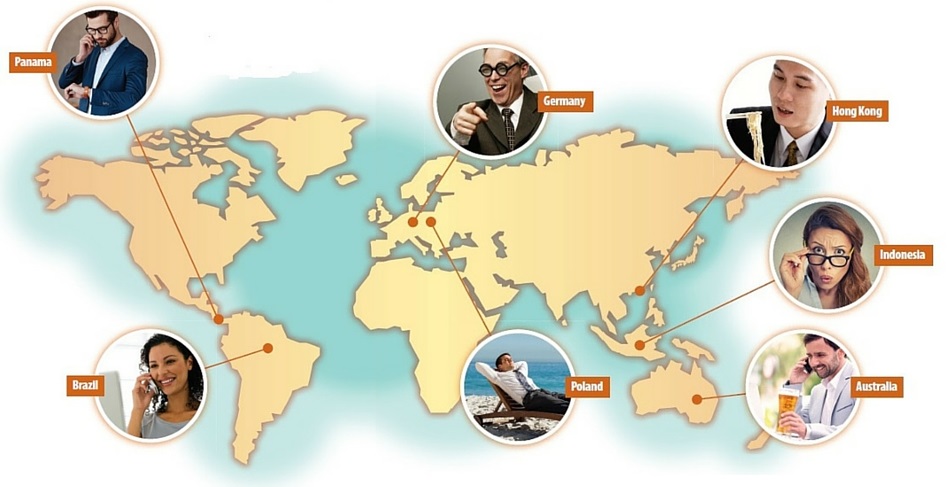Alyssa Bantle, Global Curriculum Manager, Intercultural & Language Training, Crown World Mobility offers tips for avoiding faux pas when working abroad.
 You’ve just started a new job abroad but how do you communicate? Should you be direct with the Germans but not with the Japanese? Should you avoid first names in Poland but use them in Australia? If an Indonesian asks about your weight are they being friendly or rude?
You’ve just started a new job abroad but how do you communicate? Should you be direct with the Germans but not with the Japanese? Should you avoid first names in Poland but use them in Australia? If an Indonesian asks about your weight are they being friendly or rude?
For people doing business abroad, and especially for those working on assignment, it can be a big surprise to find out how many cultural differences exist.
When it comes to understanding cultural differences in business, it’s one thing knowing the correct way to greet colleagues and formal guests. However, the ability to understand and adapt to business and social norms when working on assignments has become a skill of paramount importance.
It’s no surprise that cultural training is now mandatory in many major corporations when sending assignees to work abroad – for people in global mobility it’s as important as being able to do your job.
So, here are cultural tips for working in a variety of countries. You may be surprised just how different we all are …
Tip 1: When giving feedback, be as direct as you can. Concentrate on what needs to be changed or improved and point that out. Instead of ‘Perhaps you could consider...’ use something more direct such as ‘Some of this is not right, please change xyz.’ As rude as that might sound for a Brit it isn’t for a German. Still not convinced? Keep in mind that feedback which seems polite to a Brit might be both confusing and even seem dishonest to a German who values direct communication.
Tip 2: Be careful with using British humour. Germans use humour much more sparingly in professional situations. Also, British irony is often lost on Germans - and many other cultures for that matter! British people joke as a way to get someone on their side but sometimes they achieve the opposite when doing this abroad!
Tip 3: Don’t be surprised if after your presentation the German audience applaud by knocking on the table repeatedly using their knuckles.
Tip 1: Brits tend to aim on using first names too fast (or immediately) when speaking in Polish. Poles tend to be more formal and would like to be called Pan or Pani for quite some time. When speaking English, first names usage is more common but just remember to be a bit more formal initially than you would in the UK.
Tip 2: A big challenge is operating around the business calendar, which is somewhat shorter than that of the UK. Bank Holidays can often be on a Wednesday or Thursday and it is common for people to take a day or two before the holiday or even the whole week off. Always check for business holidays before planning a trip and then check with who you want to meet to make sure they will be at work.
Tip 1: Brazilians tend to associate English speaking people with the US, and might be a little confused when faced with a slightly different accent and sense of humour than they expect from an American.
Tip 2: Business meetings are often scheduled about two weeks in advance. Also, make sure you reconfirm the meeting with a call or email a day or two before it is scheduled to take place.
Tip 1: Panamanians do business with people, not companies. So a focus on building a network and maintaining relationships is key. This means finding ways to spend quality time with people and not just jumping to the task.
Tip 2: In Panama the sense of time, urgency and deadlines can be very different than in the UK, so be very conservative in estimating how long it will take and how much it will cost to complete a project. This applies to large scale projects as well as tasks you outsource or delegate.
Tip 1: You will almost certainly be offered snacks or tea at business meetings. It is good practice to wait for the host to drink (or eat) first or to specifically ask you to begin.
Tip 2: Indonesians may not hold back on some topics not often discussed or considered rude in the UK. These could include your weight, marital status, age and religion. Plan an answer you are comfortable with ahead of time on these topics.
Tip 1: Most communication, even if the person is in the cubicle or office next to you, will be done through a computer screen on an instant messaging programme. Do not take it personally if people prefer an instant message or text to a phone call or face-to-face conversation.
Tip 2: Taking clients out for lunch is really important – a lot of locals are taking out clients to celebrate ‘Christmas, New Year and Chinese New Year’ in one meal. Going out for an informal drink after work as you would in the UK does not work well in Hong Kong. This would be seen as an official work event no matter how informal you want to make it.
Tip 1: There’s a more social approach to business in Australia. After meetings at the office are held it can continue socially at restaurants or pubs. Sometimes there may even be personal invites to people’s houses for BBQ’s. This is just as important as the main meeting to build that relationship and get to know the client better.
Tip 2: Dress style is largely smart causal rather than full business suits. More conservative businesses will certainly still dress more formally but in many cases being ‘overdressed’ will not be seen as a sign of respect as it might be in the UK.
The more you look into global business culture, the more apparent differences become and the potential impact this can have on working relationships and networking abroad.
But it is also important to remember there are no guarantees with doing business in other cultures - no matter how much you know. People and cultures are always full of surprises. That is why the most important thing is to be curious at all times. Even if you are in a familiar situation or with a client or colleague you feel you know well, try not to make assumptions.
Consider cultural differences an opportunity to explore, not just the differences but what they mean and how they developed.
What does that ambition look like? Well, make sure you truly observe what people are saying and doing, ask questions about what you observe and lastly, share information about cultural norms you are used to and the reasoning behind it. It takes real understanding to make a success of doing business abroad.
 Alyssa Bantle is an expert in cross cultural training, a professional business coach and Global Curriculum Manager for Crown World Mobility. She is based in Miami.
Alyssa Bantle is an expert in cross cultural training, a professional business coach and Global Curriculum Manager for Crown World Mobility. She is based in Miami.